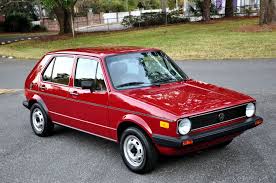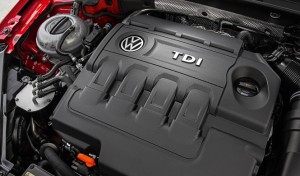In 2014 the automotive industry collectively sold just over 16, 400,000 cars and light tricks in the American market having fully come back after the economic crisis. Only 3% of them had diesel engines.
 The problems with Diesels in the United States goes all the way back to 1977 when Volkswagen launched a diesel engine Rabbit (Golf) which had outstanding fuel consumption but was considered underpowered and “sluggish” by american drivers. Diesels also had to warm up for a few seconds before driving and could, when cold, emit a black cloud of smoke. To be fair, the 1977 Rabbit was better than earlier diesels but still had the same essential problems and a full 15 Hp less than the gasoline version of the same car.
The problems with Diesels in the United States goes all the way back to 1977 when Volkswagen launched a diesel engine Rabbit (Golf) which had outstanding fuel consumption but was considered underpowered and “sluggish” by american drivers. Diesels also had to warm up for a few seconds before driving and could, when cold, emit a black cloud of smoke. To be fair, the 1977 Rabbit was better than earlier diesels but still had the same essential problems and a full 15 Hp less than the gasoline version of the same car.
Over the last five years, VW has sold over 480,000 diesels essentially arguing that common rail, TDI technology and pollution controls made the cars clean and fun to drive. In fact, in parts of the country where much of the electricity production was produced with coal, VW could argue that modern diesels could be considered about as clean as electric cars.
Blue Motion a lie?
 VW’s clean diesels fall under its blue motion campaign discussed in a post earlier this week and now it seems that VW’s 1.6 liter EA189 engine and its 2.0 liter EA288 engine were fitted with advanced software which would only turn on the full set of pollution control technology when being tested in the regular inspections that each car must endure in the United States. The rest of the time, the car would turn off the pollution control devices.
VW’s clean diesels fall under its blue motion campaign discussed in a post earlier this week and now it seems that VW’s 1.6 liter EA189 engine and its 2.0 liter EA288 engine were fitted with advanced software which would only turn on the full set of pollution control technology when being tested in the regular inspections that each car must endure in the United States. The rest of the time, the car would turn off the pollution control devices.
The thing is when you turn the devices off the car has better performance in terms of pick up and horsepower but pollutes 15-35 times the allowable amount of NOx depending on the make and model.
The engines can be found on the VW Jetta, Beetle, Golf and Passat and the Audi A3.
A serious problem
 A friend who drives a 15 year old Audi which does not, of course, have any of the new technology, told me he suddenly feels bad driving his car. The resale value of the cars in the United States has fallen through the floor and more than anything the people who bought the vehicles feel like they have been cheated. Imagine how excited the american lawyers must be!
A friend who drives a 15 year old Audi which does not, of course, have any of the new technology, told me he suddenly feels bad driving his car. The resale value of the cars in the United States has fallen through the floor and more than anything the people who bought the vehicles feel like they have been cheated. Imagine how excited the american lawyers must be!
In addition to problems with their customers, VW also faces serious fines from the american authorities at the national and state level and I’m not sure if the billions of dollars that VW has set aside to deal with he crisis will be enough.
Unrealistic expectations
It seems that the outgoing CEO of VW, Martin Winterkorn, had urged VW’s american division to reach 800,000 cars by 2017 as compared to the 367,000 cars they sold in 2014.
20-25% of vehicles sold were diesels and I was asked in a program on the BBC last Friday why VW resorted to the tricky software. In my view the only thing that really differentiated VW from its rivals was its high tech image in Diesels and even if consumers would eventually buy the cheaper gasoline models of Jetta, beattle, etc. it was the promise of clean, lean and hyper efficient cars that got them in the showrooms.
 They say that all confidence games work in the same way. Get a person to believe in something that is too goo to be true andlet them fool themselves. In this case both the buyers of these cars allowed themselves to believe that there was no trade off for fuel economy and Sr. VW management actually believed that their technology was so good they could have almost 10 times higher diesel penetration than the market as a whole.
They say that all confidence games work in the same way. Get a person to believe in something that is too goo to be true andlet them fool themselves. In this case both the buyers of these cars allowed themselves to believe that there was no trade off for fuel economy and Sr. VW management actually believed that their technology was so good they could have almost 10 times higher diesel penetration than the market as a whole.
I have come to believe that if something is too good to be true then it probably is. The real tragedy is that blue motion does work and instead of persuading american consumers to use the technology, which is incredible, VW did not even give them a chance to choose to do the right thing for the environment. Instead, the most likely outcome will be to kill Diesel technology for the foreseeable future in the United States and maybe the world.
The good news, if there is any, is it might prove beneficial for the adoption of electric cars.

